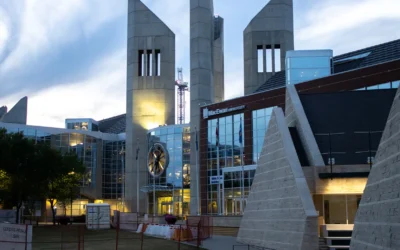City Council passes declaration
After two emotional days of City Council meetings, the City of Edmonton has acknowledged a housing crisis. The meetings were separate from the recent sweeping of encampments and the displacement of people in our city, focusing on the issue of Edmontonians experiencing or nearing houselessness.
“There are more Edmontonians becoming houseless than there are people finding homes,” stated Mayor Amarjeet Sohi during his opening remarks. “More people are staying houseless longer.”
A presentation showed that between 2021 and 2023, the number of houseless people nearly doubled from 1,560 to a historic high of 3,170 people, as was reported in December.
“We cannot continue to respond to the symptoms of the problem,” Mayor Sohi stated during the January 15 special meeting.
Given the gravity of the proposed emergency declaration, Sohi presented a motion on Monday afternoon that included a list of actions. One is that the Government of Canada, the Government of Alberta, and the Confederacy of Treaty Six First Nations will meet collectively to find solutions to the houselessness emergency.
“To provide safe, adequate and affordable housing for all Edmontonians, an investment of $15.4 billion over the next ten years is required from all levels [of government],” Sohi said.
Immediately following a meeting of governing bodies, the council agreed to action 4.0, which states that a task force “led by Mayor, City Manager, and an appointed member of Council, consisting of community leaders” must be initiated.
This task force would be mandated to “mobilize all sectors, expedite red tape reduction related to housing and houselessness.” The city will spend $3.5 million from the Community Safety and Well-being Reserve to fund “innovative solutions” to combat Edmonton’s housing crisis.
“There are more Edmontonians becoming houseless than there are people finding homes,”
Mayor Amarjeet Sohi
City Councillors unanimously approved the action, with many councillors praising its proactiveness. “As challenging and as complex as these conversations may be,” says Anne Stevenson, councillor for the O-day’min Ward, “I do come back to the fact that there is a broad agreement among us that we need to do more.”
However, the room was only sometimes calm. “Genocide! This is Treaty 6!” a person from the public gallery said. Others clapped at times, while some booed. Councillor Aaron Paquette, who was chairing the meeting, had to remind the public that council meeting etiquette must always be maintained.
Paquette reminded the gallery that he sympathizes as a First Nations person. While agreeing on the need for action, councillors Tim Cartmell, Sarah Hamilton, Karen Principe and Paquette voted against the emergency declaration.
The last action embodies the City Council’s commitment to transparency. Administration commits to reporting, publically, any immediate actions regarding the allocation of city land and how some allocation can support the actions outlined in the motion, including increasing the number of Indigenous-led, short-term housing.
“We’re making a promise as a municipality that we can fix this. We don’t have the power, we don’t have the authority, we don’t have the budget.”
Aaron Paquette, Councillor for Ward Dene
The number of short-term accommodations spearheaded by Indigenous groups that are “shovel-ready,” as Mayor Sohi explains, is numerous.
While other cities in Canada — Ottawa, Hamilton, and Toronto — have declared housing and houselessness emergencies in the past, Edmonton’s situation is unique because it does not have the same authority as Ontario municipalities. Ontario’s provincial government can freeze rent, but Alberta does not have such legislation — which may be a difficult hurdle for the city to deliver on their promises.
“We’re making a promise as a municipality that we can fix this,” Paquette says. “We don’t have the power, we don’t have the authority, we don’t have the budget.”
The emergency declaration passed with a nine to four vote in the chamber.





Very informative.
Thank you Molly! I appreciate that context on the difference in authority between Ontario and Alberta.
Thanks, Rebecca!